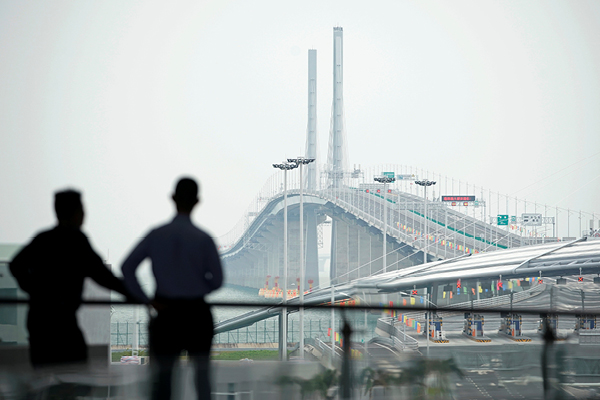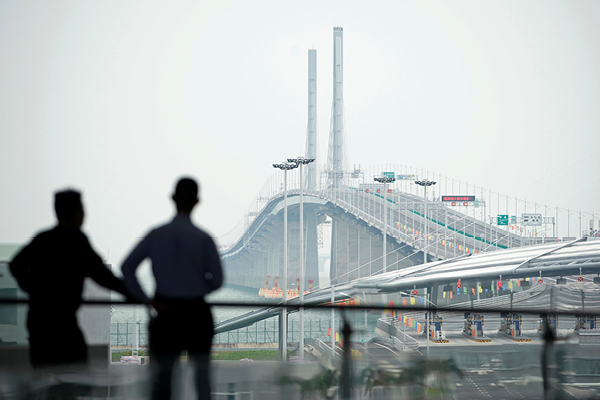
In February, China released its plan to develop a “Greater Bay Area” (GBA) around the Pearl River Delta, in a bid to spur growth in Guangdong province and the cities of Hong Kong and Macau. With its developed legal system, strong presence of practitioners and impartial disputes bodies, lawyers feel that Hong Kong is set to become the legal hub for the GBA.
China’s cabinet unveiled in February a blueprint to develop a “Greater Bay Area” (GBA) around the Pearl River Delta, that involves Hong Kong, Macau and nine cities in Guangdong Province, namely Guangzhou, Shenzhen, Zhuhai, Foshan, Dongguan, Zhongshan, Jiangmen, Huizhou and Zhaoqing. According to Reuters, the area is home to some 68 million people and has a combined gross domestic product of about $1.5 trillion, roughly equivalent to that of Australia or South Korea. The development plans will “further enhance and support a leading role of Guangdong-Hong Kong-Macau Greater Bay Area in national economic development and opening up,” Reuters quoted the State Council, or cabinet, as saying in the guidelines. It added that the plan, which includes long-term goals through 2035, is to turn the GBA into a global technology innovation centre and build advanced manufacturing and modern services industries, the cabinet said.
While connectivity is the plan’s greatest selling point, the legal aspects, particularly where and how disputes will be adjudicated, remain unaddressed is where it starts to get a little complicated. Hong Kong and Macau’s legal systems, modelled on the UK and Portuguese legal systems, respectively, are markedly different from that of mainland China’s, and the potential challenges which may arise because of this are not explicitly addressed in the plan. However, practitioners in Hong Kong say that Hong Kong is the obvious choice for a legal hub.
Paul Starr, coordinator of King & Wood Mallesons’ worldwide arbitration practice, sees a range of litigation work in Hong Kong, directly stemming from the GBA plan — particularly given its emphasis on construction and improvement of infrastructure. He has also noticed the “evergrowing” use of Hong Kong by mainland parties as an arbitration and litigation hub.
“In the Hong Kong courts, meanwhile, we see cutting edge litigation brought by mainland parties, often against one another (a feature which just a few years ago would rarely have occurred, mainland parties preferring to settle without litigation),” Starr says.
But Starr also thinks this will grow as the GBA becomes more established. He predicts the region will transition into “a lifestyle centre of choice”, with new malls, theatres, sports complexes and theme parks cropping up in the region, and with such projects will come a demand for legal support and market expertise.
“For many of those projects, contracting parties will select arbitration (rather than litigation) as the dispute resolution machinery of choice. I expect to see a massive increase in the use of the various arbitration institutions situated in each GBA city, especially in Hong Kong and Shenzhen,” Starr says, but adds that litigation cases will also arise in similar such projects where parties have not contracted for arbitration.
SURGE IN INFRASTRUCTURE
Thomas So, partner at Mayer Brown says that following the plan’s release, similarly expects “a surge” in infrastructure projects and M&A activities. “It is likely that there will be disputes arising out of these projects and transactions and it is expected that many of these disputes will generate arbitration work for Hong Kong,” So says.
So adds that, in recent years, he has watched commercial arbitration grow across Greater China and the rest of Asia. “As clients sign more commercial contracts with cross-border element, most disputes are resolved via arbitration rather than through court litigation. In Hong Kong, court litigations are predominantly human rights and judicial review cases because of the local political climate,” he explains.
Hong Kong may already have a sturdy legal reputation, but it’s no time for the city to rest on its laurels. Starr says there are additional steps the city can take to further enhance and reinforce its position. For starters, better education about the city’s advantages as a disputes hub is important as “parties are still unaware of the additional benefits which Hong Kong has, especially for resolving Greater Bay and Belt and Road disputes,” Starr observes.
While So agrees that the finance hub already has a reputation “for its robust legal system and rule of law”, he says in light of the GBA plan, now is the time to focus on connectivity with other regions. “Hong Kong probably needs to improve in having more judicial cooperation with the other ten cities in the GBA to facilitate legal and judicial services to the public as well as foreign investors in the GBA region,” he says, noting that another area for improvement is the city’s legal and judicial system, which needs to “embrace more technological changes to take their level of services to another level.”
While it might be time to update aspects of the way its legal system functions, there are unique advantages that Hong Kong possesses. In February this year, the city implemented supporting laws for third-party funding of arbitration, bringing it in line with competitor Singapore. But, as Starr points out, the city has other arbitration advantages that make it a worthy disputes destination.
“Importantly, we know that Hong Kong-based awards have a strong enforcement rate in the PRC by virtue of the Arrangement on the Mutual Enforcement of Arbitral Awards between the Mainland and Hong Kong, a feature which is unique to Hong Kong and the Mainland (and not enjoyed by other New York Convention countries),” he says.
While Hong Kong’s position as a legal hub in Asia is well established, in order to make the best of the situation in regards to the GBA, lawyers will also need to shift their mindsets, Starr says, noting the scheme will require lawyers operating in the region to provide a seamless link to their clients – just as the GBA is planned to provide a seamless link across the cities included within the region, “given the GBA’s multi-jurisdictional nature. Hong Kong law firms will want to think carefully about provide that seamless full service.”
To contact the editorial team, please email ALBEditor@thomsonreuters.com.



